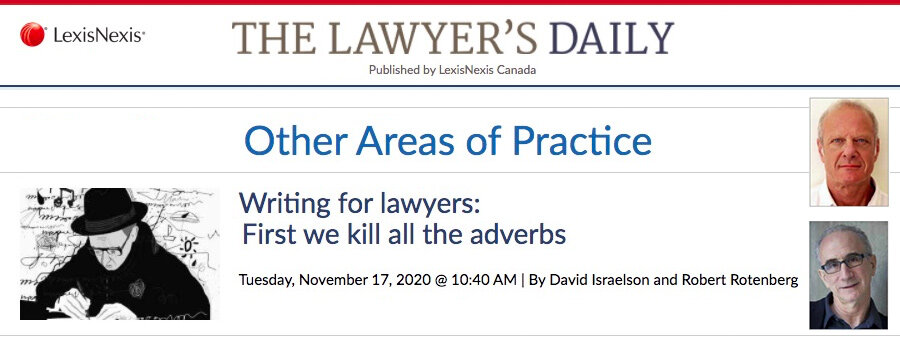
Other Writing
When Shakespeare wrote, “First thing we do, let’s kill all the lawyers,” (Henry VI, Part 2), he could have done better, not only for the lawyers but for everyone who has to read what lawyers write.
He should have demanded instead that the lawyers “kill all the adverbs.”
Adverbs? You might inquire about this questioningly. If you do, you too may be guilty of a crime against writing.
Adverbs, for those who do not follow grammar rules with bated breath the way we do, are words that modify or add description to a verb. Occasionally they are useful — there’s a difference between saying that someone talked quickly or slowly (quickly and slowly are adverbs).
But too much of the time, an adverb is used as a crutch by lazy writers. It’s a sign of lack of confidence.
“If you are using an adverb, you have got the verb wrong,” is how British author Kingsley Amis put it. They are the sentence’s lazy excuses. Getting rid of these annoying and distracting words is key to improving both your advocacy and your writing.
There is a weird, now pretty obscure, grammar game known as “coming up with Tom Swifties.” Tom Swift and later, his son Tom Jr., then Tom III and IV, are boy inventors who have been the heroes in a series of mystery adventure books for young people; the first Tom started in 1910 building stuff like “aeroplanes” and “photo-telephones” (a TV) and his offspring went on to futuristic stuff in aerospace, astrophysics and whatnot. Way back in 1911 the first Tom built a Taser.
The authors of Tom Swift books, always listed as Victor Appleton or Victor Appleton II, had a habit of overusing adverbs. Grammar nerds started joking about “Tom Swifties,” where they’d add a bad or obvious adverb to a typical sentence.
Examples: “Grammar nerds started joking,” he said funnily. Or: “Pour me a martini,” he said drily.
These joke sentences show how silly adverbs can be. The real point is that adverbs are often a waste of the reader’s time. And when you’re writing for a senior partner, for a client, for a law review or for a judge, the last thing you want to do is annoy your audience by wasting their time.
Successful writers have built careers out of avoiding adverbs. “I believe the road to hell is paved with adverbs,” Stephen King said. Scholars have analyzed the writing of Ernest Hemingway and found that he used about 20 per cent more verbs than an average writer, and used adverbs 42 per cent less than average.
Perhaps that’s why for Hemingway, the earth moved.
Now, did you watch when Kamala Harris and Joe Biden gave their victory speeches in Delaware? There’s a lesson about adverbs in both of those performances.
Without getting into the politics here (though we’re tempted), we thought the speeches were good from the start. What we really noticed from the writers’ view is how they both seemed to pick up steam near the end.
We wanted to check whether this was just our own hunch that the words got better as they went along or whether there may have been an objective reason for the improvement. So we did what we call our “adverb test.”
We downloaded the speeches and used something called “lyspace.” Nope, it’s not an app, so don’t bother googling it. It’s something we cooked up using spellcheck.
Lyspace is easy — go through a piece of writing to find out how many times the writer used words ending in “ly” followed by a space. It’s a way to pick out the adverbs in any piece of writing.
So, how many of the words in both speeches ended in “ly?” A grand total of 14.
And here’s why we think both their speeches were good. The bulk of those “ly” words weren’t adverbs, just acceptable words like “only,” “family” and “especially.”
Neither speech was perfect, mind you. Both President-elect Biden and Vice-President-elect Harris used, and arguably overused, one tiresome adverb. Naturally, that tiresome word was, “tirelessly.”
Each of their remarks picked up speed near the end, when the verbs came to the fore.
Harris said:
“But while I may be the first woman in this office, I will not be the last, because every little girl watching tonight sees that this is a country of possibilities. And to the children of our country, regardless of your gender, our country has sent you a clear message:
Then she hit her mark with strong verbs, and no adverbs:
“Dream with ambition, lead with conviction, and see yourselves in a way that others may not simply because they’ve never seen it before. But know that we will applaud you every step of the way.”
And Biden did even better:
“We cannot repair the economy, restore our vitality, or relish life’s most precious moments — hugging our grandchildren, our children, our birthdays, weddings, graduations — all the moments that matter most to us — until we get it under control.”
Using great verbs can win peoples’ confidence. Adverbs are, well, verbiage. Cleaning them out is one way to win with your writing.
David Israelson is a non-practising lawyer, author and journalist. You can follow him on Twitter @davidisraelson or on Linkedin. Robert Rotenberg is a criminal lawyer at his firm Rotenberg, Shidlowski, Jesin and the author of five bestselling legal thrillers. His sixth will be published in February 2021. Together they teach lawyers and business executives how to improve their writing and communication skills.

